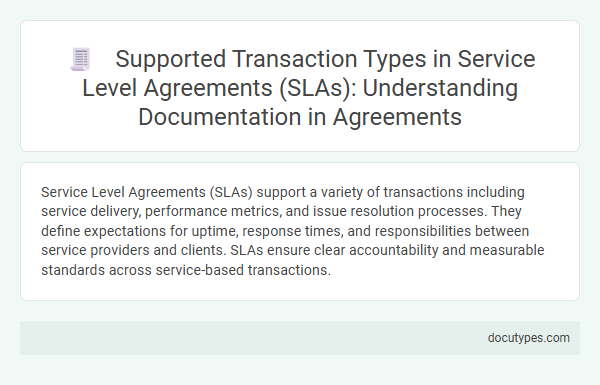Service Level Agreements (SLAs) support a variety of transactions including service delivery, performance metrics, and issue resolution processes. They define expectations for uptime, response times, and responsibilities between service providers and clients. SLAs ensure clear accountability and measurable standards across service-based transactions.
Introduction to Supported Transaction Types in SLAs
Service Level Agreements (SLAs) define the scope of transactions covered to ensure consistent performance and accountability. These agreements specify supported transaction types to align service expectations between providers and clients.
Common supported transactions include data processing, system availability, and customer support interactions. Defining these transaction types in SLAs helps measure service quality and response times effectively.
Defining Transaction Types within Service Level Agreements
| Transaction Type | Description | Impact on SLA |
|---|---|---|
| Financial Transactions | Includes payments, billing, and invoicing processes that require accuracy and timeliness. | SLAs specify maximum processing times and error rates to ensure reliability and trust. |
| Data Transfers | Movement of data between systems or offices, covering upload, download, and synchronization activities. | SLAs define bandwidth requirements, latency limits, and data integrity standards to maintain performance. |
| Customer Support Interactions | Includes requests, troubleshooting, and resolution activities related to customer service. | SLAs outline response and resolution times, guaranteeing efficient support and satisfaction. |
| System Updates and Maintenance | Scheduled activities involving software upgrades, patches, and routine upkeep. | SLAs establish maintenance windows, downtime limits, and notification procedures to minimize disruptions. |
| Order Processing | Handling of product or service orders, including order placement, confirmation, and fulfillment. | SLAs set standards for order accuracy, processing speed, and delivery timelines. |
| Security Transactions | Authentication, authorization, and access control operations that protect systems and data. | SLAs specify security protocols, response to breaches, and compliance with regulatory standards. |
Defining these transaction types clearly within Service Level Agreements ensures Your expectations for performance, reliability, and accountability are explicitly documented and enforceable.
Importance of Specifying Supported Transactions
Service Level Agreements (SLAs) support a wide range of transaction types, including financial exchanges, data transfers, and customer service interactions. Specifying the supported transactions in an SLA ensures clear expectations and accountability between service providers and clients. Precise transaction definitions help prevent disputes and enhance the reliability of service delivery.
Documentation Standards for Transaction Types
What types of transactions are supported by Service Level Agreements (SLAs)? Service Level Agreements typically support a wide range of transactions including data transfers, service requests, and issue resolutions. Documentation standards for these transaction types ensure clarity, consistency, and measurable performance metrics.
Common Transaction Types Covered in SLAs
Service Level Agreements (SLAs) typically cover a variety of common transaction types to ensure performance and reliability standards are met. These transactions often include data processing, system uptime, and customer support interactions.
Key transaction types in SLAs encompass application availability, response time for service requests, and incident resolution. These agreements define measurable criteria to guarantee service quality across critical business operations.
Exclusions: Unsupported Transaction Types
Service Level Agreements (SLAs) define the scope of supported transaction types, explicitly excluding certain categories to clarify provider responsibilities. Understanding these exclusions helps manage expectations and prevents disputes related to unsupported services.
- Unsupported Transaction Types - Transactions involving illegal or unauthorized activities are not covered under SLAs.
- Custom or Experimental Transactions - SLAs typically exclude non-standard or newly developed transaction types that haven't undergone thorough testing.
- Third-Party Integrations - Transactions processed via third-party services outside the provider's control are generally excluded from SLA coverage.
Structuring Transaction Information in Agreements
Service Level Agreements (SLAs) clearly define the scope and types of transactions covered to establish performance expectations. Structuring transaction information in agreements ensures clarity and enforceability of service commitments.
- Operational Transactions - These include daily service activities such as data processing, call handling, and system uptime metrics.
- Financial Transactions - Encompass billing processes, payment timings, and reconciliation activities specified to meet agreed standards.
- Support Transactions - Cover incident reporting, resolution times, and escalation procedures to ensure timely issue management.
Best Practices for Documenting Transactions in SLAs
Service Level Agreements (SLAs) support various transaction types, including data exchanges, service requests, and system updates. Best practices for documenting transactions in SLAs emphasize clear definitions, measurable performance metrics, and explicit responsibilities. Your SLA should include detailed transaction descriptions to ensure accountability and effective service management.
Legal Implications of Transaction Type Documentation
Service Level Agreements (SLAs) support various transaction types including financial exchanges, data transfers, and service deliveries. These agreements define the performance standards, responsibilities, and remedies related to each transaction type.
Documenting the specific transaction types within an SLA carries significant legal implications. Clear documentation ensures enforceability by outlining the scope and limitations of services, reducing the risk of disputes. You benefit from precise definitions that protect your rights and clarify obligations under the agreement.
What Types of Transactions Are Supported by Service Level Agreements (SLAs)? Infographic

